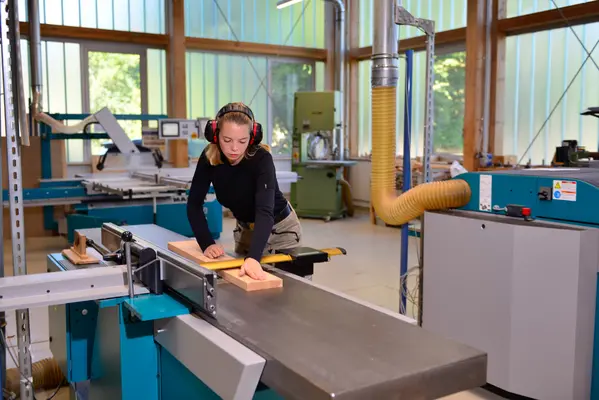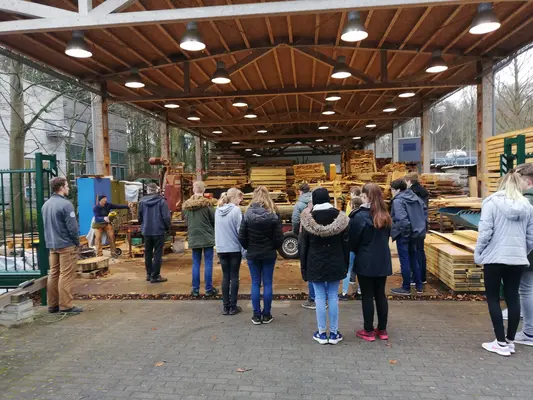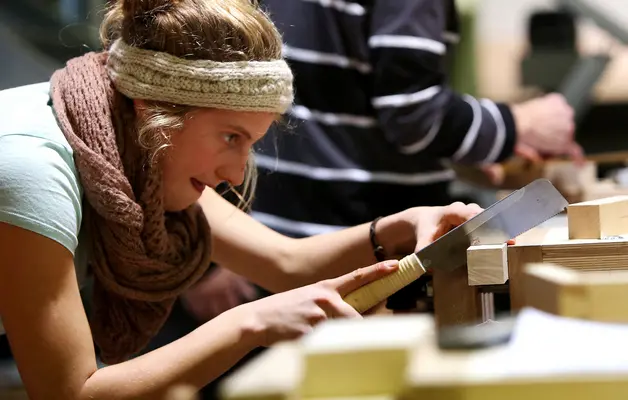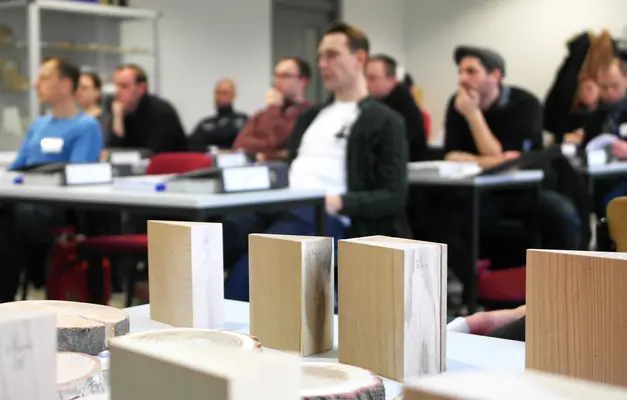Individual study contents
You will acquire the basics in four semesters of "practical phase - company". In the training-integrated variant, you also complete the second and third year of training. In parallel, you will learn the basics of wood engineering in supported distance learning and mathematical-engineering content. From the fourth to the seventh semester, you will specialise within the scope of the chosen specialisation in full-time studies. After the "practical phase - specialisation" and the Bachelor's thesis in your company, you complete the programme in the eighth semester with the Bachelor of Engineering (B.Eng.).
Modules per semester
After an introductory event at the university, the first distance learning phase begins. We support you with online events such as lectures and consultations. During the block week, you study in presence at the university. You complete the four-semester "Practical phase - basics" in the context of your company activities.
In the "practical phase - basics" you will learn about operational, production and administrative processes and their importance for the overall process in the company. You will receive a cross-sectional qualification in relation to the material wood, woodworking technology and the wood industry. You will understand production processes and organisational structures and can transfer these to other areas of the industry.
You model practical problems in statics and strength theory with mathematical tools and present the results. Familiar with mathematical and physical methods and ways of thinking, you apply them in other basic subjects and advanced courses. You understand scientific working and thinking methods as the basis of all engineering activities.
In the second semester, you will further deepen the basics and you will continue your practical phase - basics.
In the "practical phase - basics" you will learn about operational, production and administrative processes and their importance for the overall process in the company. You will receive a cross-sectional qualification in relation to the material wood, woodworking technology and the wood industry. You will also understand production processes and organisational structures and can transfer these to other areas of the industry.
You deepen the basics of strength theory and the mathematical tools. You are familiar with analytical methods of dynamics (kinematics and kinetics). You solve engineering problems and issues and know physical mechanisms in dynamic and fluidic systems. You can assess and evaluate structural properties of the raw material wood.
In the third semester, the basics are further deepened and you continue your practical phase - basics.
In the "practical phase - basics" you will learn about operational, production and administrative processes and their importance for the overall process in the company. You will receive a cross-sectional qualification in relation to the material wood, woodworking technology and the wood industry. You will also understand production processes and organisational structures and can transfer these to other areas of the industry.
Now you will learn the basics of electrical engineering and solve electrical engineering problems using mathematical methods. You will understand electrical and electronic applications in mechanical and timber engineering and classify electrical systems. With an electrotechnical specialist, you can analyse systems, develop approaches for concrete circuit tasks and arrange for purpose-specific work.
In the fourth semester, the basics are further deepened and you continue your practical phase - basics. Depending on the specialisation pursued, you will now attend a selected course.
In the "practical phase - basics" you will learn about operational, production and administrative processes and their importance for the overall process in the company. You will receive a cross-sectional qualification in relation to the material wood, woodworking technology and the wood industry. You will also understand production processes and organisational structures and can transfer these to other areas of the industry.
You are familiar with scientific work and can apply descriptive statistics to experimental data and assess the results of third parties. You assign basic operations of mechanical process engineering to the production of wood-based materials. You have basic knowledge of dimensioning in timber construction - see description TM H1d. The competences can be a prerequisite for admission to advanced modules.
Your attendance studies begin. In addition to further basic modules, you will take specialised modules according to your specialisation. In the wood technology specialisation, there is a further possibility to specialise your studies by selecting a compulsory elective module.
You will learn the basics of machining wood and wood materials as well as terms of production technology and process models of machining. You are just as familiar with cutting materials and their areas of application as you are with the processes involved when a cutting edge engages with the material wood. You will know the machines and systems for geometrically specific products made of wood and wood-based materials.
You will gain a basic insight into sustainable development as a whole and specifically in relation to available raw materials and resources.
The focus is on structuring, designing and planning development processes in interior design and timber construction. We teach the design aspects of product development, communication skills with team members and third parties as well as presentation techniques for different target groups.
You will be able to design and calculate simple timber constructions with connections and joints, acquire knowledge of repair connections in renovation, have knowledge of the typical construction methods in timber construction, the use of design software and be able to understand and assess calculations and designs of other planners.
We teach you to understand building law contexts, to select basic designs and details for components and to develop components and connections that meet requirements. You will determine smoke management options and calculate components according to model fires of the IndBauRL. You will file the material requirements of the architectural planning and create rough fire protection concepts.
You will learn to define quality, communicate requirements and measure the criteria. The focus is on process structures, quality criteria and their recording. You will learn how to evaluate information and control the process. Mathematical-statistical methods for process evaluation are taught. You will apply the theoretical knowledge with the help of a practical example.
You can choose your elective modules from Business English, Production Planning, Fire Protection, Wood Material Technologies, Special Wood Biology, Marketing, Fundamentals of Design and Building Construction, Building Physics Measurement Technology, Raw Timber Quality, Sawn Timber Grading, Wood in Construction, Automation Technology and Factory Planning.
You continue your attendance studies with basic and specialisation modules. In the specialisation field of structural engineering, there is a further possibility to specialise your studies by selecting a compulsory elective module.
In the module you will gain basic knowledge of wood chemistry and wood preservation, chemistry in engineering sciences, the chemical structure of wood, chemical wood properties and the application limits of wood. You will understand connections between the structure of wood components and their function, know wood-destroying fungi and insects as well as the basic measures of wood protection.
With basic engineering knowledge of mechanical engineering and metallic materials science, you will understand the relationships between materials, machine elements and design. In the design process, you will apply this to simple mechanical engineering components in accordance with standards. You will become familiar with sample production, series introduction, maintenance and repair work. You will be able to formulate the design requirements for complex mechanical engineering problems.
You will learn about the engineering requirements for joints. In addition to the theory, we teach the construction of joined components made of wood and hybrid components. On excursions, you will learn about process technologies using industrial examples. You will apply current standards for load-bearing and non-load-bearing bondings and master natural science and engineering planning methods of a bonded joint.
We teach the basics of building planning, jointly analyse partial and overall concepts in the planning process, apply the optimisation approaches for the use of solar inputs, summer thermal insulation and thermal comfort, understand the requirements and optimisation options for the thermal envelope of buildings and develop concepts for the energy supply of buildings.
You analyse mechatronic systems with engineering, electrical engineering and machine science fundamentals supplemented by mechatronic fundamentals and engineering mathematics. You can design and build simple systems. You have practical skills, confident handling of laboratory and measuring equipment and evaluate data with suitable statistical methods.
In relation to the knowledge of anatomical and structural differences of the wood species, process engineering references are made and different process variants are dealt with. Students structure raw materials according to their quality and sort their uses in production. This is followed by the teaching of methods for structuring the production process. For the wood industry, aspects of process control are learned and quality criteria are taught.
At least one of the offered compulsory elective modules CNC 1, Sustainable Construction - Material Cycles 1, Special Materials Science, Production and Processes for Components and Building Elements, Properties of Wood and Wood-Based Materials with Relevance to Construction, Alternative Production Processes must be selected in the Building Construction specialisation.
You complete your classical study modules in the seventh semester. In the specialisation in structural engineering, there is also the option of selecting a compulsory elective module.
Here, basic knowledge of wood physics and wood chemistry as well as wood pyrolysis is the topic. You will learn about properties such as behaviour towards moisture and temperature as well as mechanical, rheological and acoustic properties. The students measure physical wood properties, can assess the standard-compliant use of wood and acquire knowledge of pyrolysis, combustion and gasification of wood.
Our students apply in-depth knowledge of mechanical engineering fundamentals to the design and analysis of machines and systems. They are thus able to design welded constructions. They calculate stresses and deformations in complex components and can estimate the service life of the components.
We teach how to design new wooden structures and calculate them according to current standards.
Students know the basics of design theory with regard to sustainability and develop planning requirements for energy-efficient, sustainable buildings. They are familiar with the assessment of requirements of energy-efficient, climate-neutral construction methods, know methods of energy balancing, assess and optimise construction methods as well as characteristic values of thermal building physics and building climatics.
You analyse mechatronic systems with engineering, electrical engineering and machine science fundamentals supplemented by mechatronic fundamentals and engineering mathematics. You can design and build simple systems. You have practical skills, confident handling of laboratory and measuring equipment and evaluate data with suitable statistical methods.
In relation to the knowledge of anatomical and structural differences of the wood species, process engineering references are made and different process variants are dealt with. The students structure raw materials according to their quality and sort their uses in production. This is followed by the teaching of methods for structuring the production process. For the wood industry, aspects of process control are learned and quality criteria are taught.
At least one of the offered compulsory elective modules CNC 1, Sustainable Construction - Material Cycles 1, Special Materials Science, Production and Processes for Components and Building Elements, Properties of Wood and Wood-Based Materials with Relevance to Construction, Alternative Production Processes must be selected in the Building Construction specialisation.
You will be taught the physical-technical knowledge of basic manufacturing technology processes. The mechanical and thermal principles for the manufacture of solid wood products are taught.
After this module, you will be able to categorise and name the manufacturing processes, use and assess machine tools professionally in planning.
We present the basics of wood processing and lignocellulosic plants into panel-shaped materials in chipboard and fibreboard production - including the preparation of wood raw materials into particles as well as mixing and agglomeration processes. Tasks and experiments in the laboratory of the Fraunhofer Institute for Wood Research deepen the contents.
The module shows interactions between materials and process influences using the example of veneer production. The effect of chemical and physical process variables on product quality is taught using plasticisation, cutting process, drying, etc. as examples. Thinking in variants to achieve technological goals is also part of the module.
You can take modules from Business English, Production Planning, Quality Assurance, Marketing, Special Wood Biology, Fundamentals of Design and Construction, Building Components, Building Physics Measurement Technology, Sustainable Construction - Material Cycles 2, Raw Timber Quality, Sawn Timber Grading, Wood in Construction, Automation Technology or Factory Planning.
At the beginning of the eighth semester, you complete the practical phase - specialisation as an internship in your company. You write your Bachelor's thesis there. You work on an engineering topic in a scientific report. With a successful defence, you complete your studies and receive the Bachelor of Engineering degree.
In the practical phase, you will prepare for your professional activity with engineering-related activities and practical content and apply acquired theoretical knowledge and skills. You will also prepare for a management position with economic and social responsibility.
With your final thesis, you complete the engineering-related part of the training. With your final thesis, you will implement theoretical knowledge and work on a transfer-oriented task within 12 weeks. You will apply scientific methods to develop efficient, practically applicable solutions. In the process, you will gain further experience in self-management.





